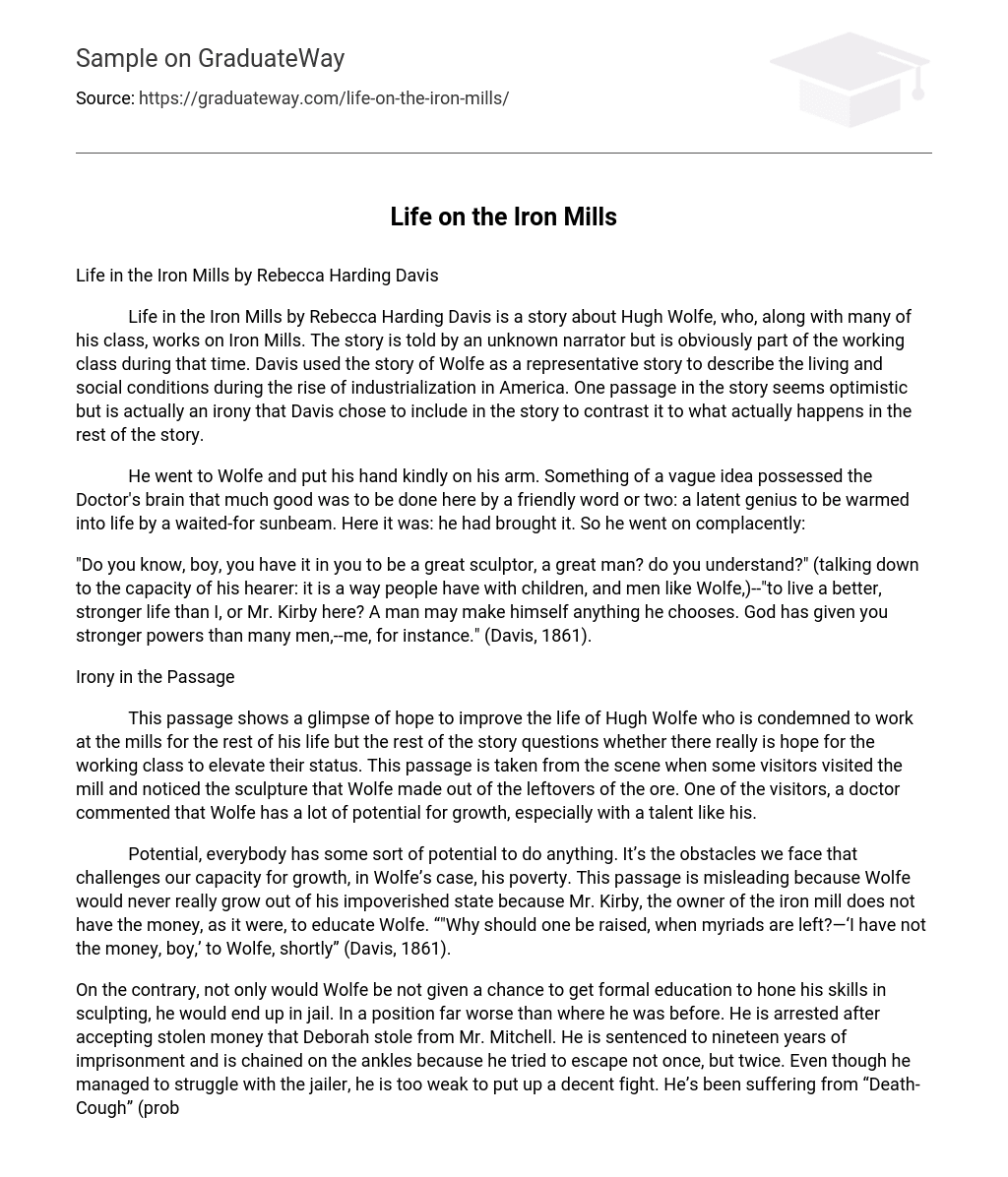Life in the Iron Mills by Rebecca Harding Davis
Life in the Iron Mills by Rebecca Harding Davis is a story about Hugh Wolfe, who, along with many of his class, works on Iron Mills. The story is told by an unknown narrator but is obviously part of the working class during that time. Davis used the story of Wolfe as a representative story to describe the living and social conditions during the rise of industrialization in America. One passage in the story seems optimistic but is actually an irony that Davis chose to include in the story to contrast it to what actually happens in the rest of the story.
He went to Wolfe and put his hand kindly on his arm. Something of a vague idea possessed the Doctor’s brain that much good was to be done here by a friendly word or two: a latent genius to be warmed into life by a waited-for sunbeam. Here it was: he had brought it. So he went on complacently:
“Do you know, boy, you have it in you to be a great sculptor, a great man? do you understand?” (talking down to the capacity of his hearer: it is a way people have with children, and men like Wolfe,)–“to live a better, stronger life than I, or Mr. Kirby here? A man may make himself anything he chooses. God has given you stronger powers than many men,–me, for instance.” (Davis, 1861).
Irony in the Passage
This passage shows a glimpse of hope to improve the life of Hugh Wolfe who is condemned to work at the mills for the rest of his life but the rest of the story questions whether there really is hope for the working class to elevate their status. This passage is taken from the scene when some visitors visited the mill and noticed the sculpture that Wolfe made out of the leftovers of the ore. One of the visitors, a doctor commented that Wolfe has a lot of potential for growth, especially with a talent like his.
Potential, everybody has some sort of potential to do anything. It’s the obstacles we face that challenges our capacity for growth, in Wolfe’s case, his poverty. This passage is misleading because Wolfe would never really grow out of his impoverished state because Mr. Kirby, the owner of the iron mill does not have the money, as it were, to educate Wolfe. “”Why should one be raised, when myriads are left?—‘I have not the money, boy,’ to Wolfe, shortly” (Davis, 1861).
On the contrary, not only would Wolfe be not given a chance to get formal education to hone his skills in sculpting, he would end up in jail. In a position far worse than where he was before. He is arrested after accepting stolen money that Deborah stole from Mr. Mitchell. He is sentenced to nineteen years of imprisonment and is chained on the ankles because he tried to escape not once, but twice. Even though he managed to struggle with the jailer, he is too weak to put up a decent fight. He’s been suffering from “Death-Cough” (probably tuberculosis) that made him weaker. Finally, after observing the free men outside his cell, he knew that he would never be free, and that even if he did go out, he won’t be able to connect to anyone spiritually. He cut his wrists to end his miserable life.
Conclusion
Davis used that passage as an ironic element to be contrasted to what is to happen in the rest of the story. The passage provides what could have been Wolfe’s fate had he been given a chance to work on his craft. It could have been the turning point of Wolfe’s monotonous and dull life but his social stature prevents him from getting out of poor “Life in the Iron Mills.”
Reference
Davis, R. H. (1861). Life on the Iron Mills.





